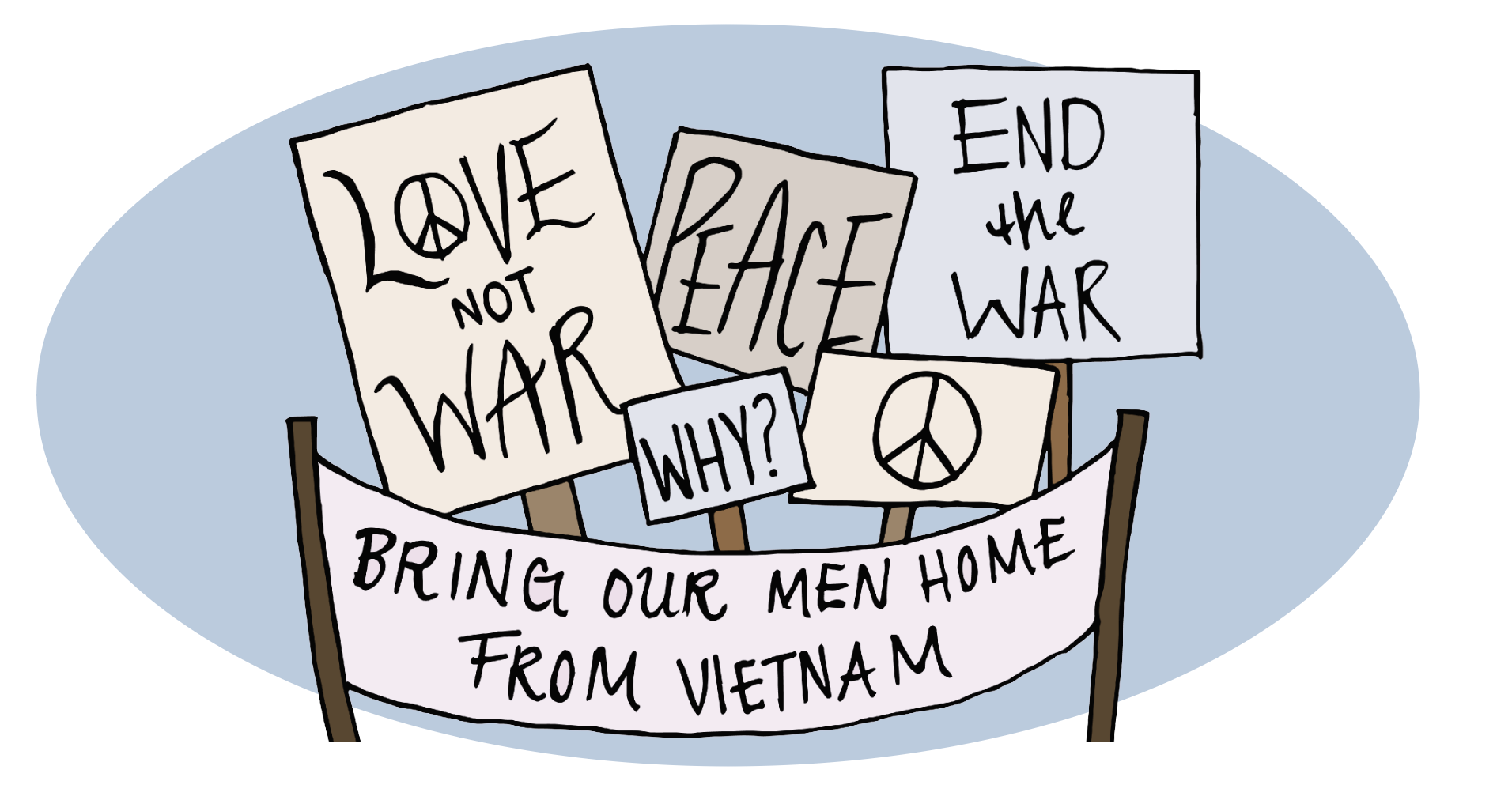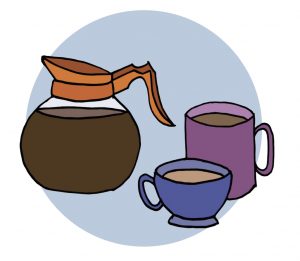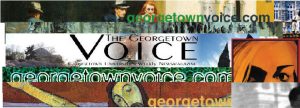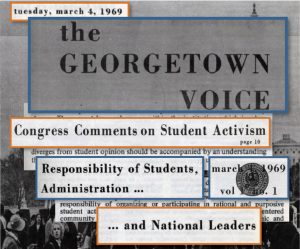The Voices section reached out to Voice alumni from throughout our 50 years and asked them the question,
What does the Voice mean to you?
Jason Kelly (COL ’96) Editor-in-Chief, Spring 1995
My memories of the Voice are too numerous to capture in a couple hundred words, unless I default to a Larry King-like, ellipses-riddled regurgitation.
Driving all night to Storrs, Connecticut, to cover a basketball game … the terror and thrill of pinning a cover story on the board for editing … debating editorials on the Leavey bridge as the sun rose … helping plan the 25th anniversary of the paper by cold-calling alumni at newsrooms around the country.
During that last exercise, I realized there were people who’d sat in the same seats—probably literally (the furniture in 413 Leavey was not new)—who were actually making a living and an impact: folks like Brian Kelly (COL ’76) and Margaret Sullivan (COL ’79).
While I’m proud of Georgetown in general, I confess to a much deeper pride when I see Voice alum producing kickass journalism.
Heather Vogell (COL ’96) helped uncover a massive cheating scandal at Atlanta’s public schools. Andrew Rice (COL ’97) has written some of the most incisive stories about New York real estate, including the money around a certain developer-turned-president.
Last year, I came back to D.C. for the White House Correspondents’ Dinner and walked out of my company’s reception to find fellow Voice alums Michelle Jaconi (SFS ’96, GRD ’97) and Anthony Zurcher (SFS ’94). We hugged and chatted and took a moment to appreciate that it all started for us in that dingy corner office. There we were, two decades later, real live journalists, applying what we’d learned just a few miles away.
Alex Boyd (COL ’18) Editor-In-Chief, Spring 2018
One of these other Carrying On’s will say that this magazine is a family. This statement is wonderful and true, but the Voice could also be cliquish, and sometimes I felt like I didn’t completely belong. A lot of that is on me because I was surrounded by very special people.
Several of these reflections may explain how going through hell makes you stronger. That the late nights are worth it, and that they prove your potential. But my time on the magazine made me more acutely aware of just how little I know and of how much progress I still have to make towards becoming a better worker and person.
But maybe that’s the magical thing about the Voice: It didn’t require blind faith. It didn’t demand my ritual humiliation or ask me to beg for the approval of someone 14 months older than myself. It didn’t boast to be the greatest thing in my life. I was encouraged to be critical, to admit the club’s imperfections, and people cared to listen. The Voice was aware of its faults and driven to fix them. That’s why I’d do it again. That’s why you tolerate the bullshit. Because at the Voice, I was able to think freely. I was able to lower my shield just a little. I didn’t have to pretend to be the big strong man I’m not, nor hide that I get a little lost and a little sad sometimes. I didn’t have to lie that the Voice was perfect. It’s not and never will be. But I knew the Voice would always question itself as much as anybody else.
Joel Wolfe (SFS ’82) Managing Editor, Spring and Fall 1981
Writers, cartoonists, and the ad folks never turned in anything early. That is one of my enduring memories of my time as the managing editor of the Voice.
Serving as the managing editor wasn’t an awful job, but it had its headaches. One night, with a majority of staffers out with some illness, I left the offices late and feeling sick myself. I left with promises that the cartoon for the next day’s paper was “on the way.” I awoke to a paper without a cartoon. The space was filled with a doctored picture of Reagan and Bush that made an idiotic political point.
For my sin of leaving early and not knowing what would fill the cartoon’s place, I had to answer the angry letters that poured in over the next month or so.
Most of my memories from the Voice are of working with terrific people who put in long hours for the paper, and took enormous pride in what we produced each week.
I’m now officially old enough to have foggy memories of my undergraduate days, but I do know that being a part of the Voice was one of the best things I did at Georgetown. I drove a GUTS bus to help pay my way, but I worked on the Voice because I loved it.
I read carefully and with pride the online version of the Voice. It has been and will continue to be such an important part of Georgetown for me and countless others. I couldn’t be prouder to have been part of it.
Kate Washington (COL ’94) Managing Editor – Production, Fall 1993
As a 17-year-old from a just-okay public high school in rural California, in fall 1990 I found Georgetown deeply intimidating. I felt like an impostor among polished classmates from prep schools and missed the hometown I’d eagerly fled. Thank god I found the Voice.
There were all the cynical, liberal, sarcastic fellow students I had longed to meet: my people. At the Voice, everyone viewed the reigning university establishment with a jaundiced eye. To get in, two things mattered: First, you had to be willing to postpone all your schoolwork until R.E.M.’s “I Am Superman” played in triumph and the pages were headed to the printer. Second, and more importantly, the writing you pinned up on the office bulletin board had to be decent. If it was bad, the brutal collective editing process would quickly set you straight; if it was good, you could still expect skepticism.
I was an English and history double major, but I learned more about writing at the Voice than anywhere else, in school or my subsequent career as a writer. I still keep in mind a Voice colleague’s dictum about feature writing—“quotes are like treats for the reader!”—and I got the best training possible in writing quickly, cleanly, and to word count, plus a side course in journalistic ethics, some rules which we learned by breaking.
Leigh Finnegan (COL ’13) Editor-in-Chief, Fall 2012
Signing up for the Voice freshman year was among the best decisions I made in college. I joined the leisure section, which was great because it allowed me to use something I really enjoyed—writing—as a means of following my one true passion: watching television. Later on I edited the leisure section, then edited Vox Populi (which is now defunct, but I swear, at the time it was a pretty big deal), then became managing editor, editor-in-chief, and finally, second-semester senior who had no official job but came in on Wednesday nights anyway, probably out of Stockholm Syndrome.
On the Voice, I honed my writing skills, gained leadership experience, learned what an em-dash was, and, most importantly, met some of my best friends—and my fiancé, another one-time leisure editor (our kids will be insufferable). Career-wise, I wound up going to medical school, and I even credit the Voice with that: not only did it give me a lot to talk about in interviews, but production nights taught me that staying awake for upwards of 24 hours isn’t as bad as it sounds, provided you have the right people and the right music—namely, Hall and Oates at midnight and Trey Songz at 3 a.m. I continue to write, and my dream is to incorporate that into my medical career, a la Atul Gawande.
So happy 50th birthday, the Voice! You look great for your age and are still as spry and witty as ever. Have yourself a glass of champagne (the cheap stuff) and celebrate a little—you’ll be needed by future generations of Georgetown students who are too cool for The Hoya.
Michael Winship (COL ’73) Features Editor, Spring and Fall 1971, Spring 1972
The Voice introduced me to a gang of witty, smart, articulate reprobates and rebels who had done something unheard of—swimming against the tide of the university establishment and creating an infant publication out of nothing but talent, a commitment into truth, and a heartfelt embrace of good times.
We wrote, edited, and photographed for the Voice against the backdrop of the Vietnam War and the student protests against it, all while the danger of a military draft whispered at our necks. It was a time not long after the assassination of Martin Luther King, Jr., and rioters had burned vast parts of Washington. And years before Watergate, we had already suffered the indignities of Nixon, Agnew, and their various corrupt pals.
I remember one morning during the violent Mayday anti-war demonstrations of 1970, when several of us were at the Key Bridge covering the protests and went hurdling back toward campus when the police attacked. We dashed to 36th Street and ran smack into a massive wall of tear gas. But I also remember covering the grand opening of the Kennedy Center and being sloppily kissed by Leonard Bernstein at the afterparty. And I especially remember the evenings of camaraderie spent in the Voice offices, at the compositors in the Car Barn, at the printer in Silver Spring where we put the paper to bed and that all-night coffee shop to which we retired, hungry, worn out, and slaphappy.
Rick Newcombe (COL ’72) Editor-in-Chief Spring and Fall 1971, Spring 1972
The Georgetown Voice helped prepare me for a career in media, and my experiences at the paper taught me great lessons in teamwork, friendship, humility, and gratitude. But more importantly, the paper helped me find my voice and learn how to help others find theirs. These are lessons that have lasted a lifetime.
We looked for stories that would generate controversy and conversations all over campus. We ran fantastic photographs, thanks primarily to John Baldoni, and we would print between 16 and 20 pages every week. In hindsight, going from bi-weekly to weekly was a herculean task.
The big news at the time was the Vietnam War, which nearly everyone on campus opposed, and we ran dozens of articles about the protests that came regularly to the nation’s capital. We ran stories about health care, abortion, heroin, methadone, crime on campus, Scientology, prison reform, D.C.’s “gay subculture,” health and fitness, women’s rights, and economic privilege—the latter addressed in a Voice magazine supplement with the headline, “The Affluent Student.” In other words, the hot topics then remain timely today.
A group of us would drive to Silver Spring late at night every week to watch the press run and make sure the printing was clean and clear. Then we’d stop for a late dinner or early breakfast—I can’t remember which. By five in the morning, the newsstands on campus would have anywhere from 4,000 (our early circulation) to 10,000 copies of the Voice.
This post has been updated.
Correction: A previous version of this story misstated the graduation year of Rick Newcombe. He graduated in 1972, not 1973.






